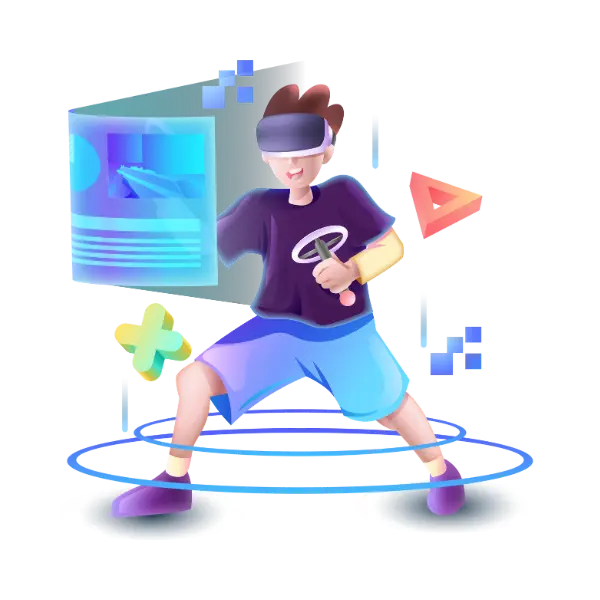Introduction
Start your Android game development today!
Our expert team is here to guide you every step of the way.

The Evolution of VR in Android Game Development
Early Beginnings of VR in Gaming
As part of this evolution, Android game development companies began exploring VR as a powerful tool to innovate the mobile gaming market. These companies are driving the adoption of immersive technologies to deliver more dynamic and engaging experiences.
The Shift Toward Mobile VR
The shift to mobile VR really took off with the introduction of devices like Google Cardboard and Samsung Gear VR. These devices made VR affordable and accessible to the average Android user. Although simple, they allowed users to experience VR firsthand. These early innovations laid the foundation for more advanced VR games development on mobile, making it possible for developers to build more complex and interactive experiences.
The Role of VR in Android Game Development

Immersive User Experience
Expanding Gameplay Possibilities
When it comes to Android Game Development, the possibilities for gameplay expand far beyond touch controls and swipes. Android game developers can now integrate gesture-based interactions, head tracking, and spatial movements into their games. This opens up a new world of creativity for developers, allowing them to craft more dynamic and interactive gameplay experiences.
Companies offering Android game development solutions are continuously improving the capabilities of VR, ensuring that games are optimized for both performance and immersion.
For example, rather than tapping the screen to perform actions, users can control movements with their head or body. This is a game-changer for genres like first-person shooters, puzzle games, and adventure titles. Development in VR for Android Game allows developers to think outside the box, creating gameplay experiences that would have been unimaginable on traditional platforms.
Tools and Game Engines for VR in Android Game Development
Unity and Unreal Engine
Game engines play a crucial role in the development process of Development. Unity and Unreal Engine are two of the most widely used game development engines, both offering comprehensive support for VR. Unity, known for its simplicity and compatibility, is a favorite among developers working on Android VR projects. It provides pre-built assets and VR tools, making the development process smoother.
By utilizing these engines, Android game developers can craft high-quality VR experiences that are visually impressive and run efficiently on a variety of mobile devices.
Google VR SDK
In recent years, many Android game development companies have started to rely on Google VR SDK to bring seamless VR experiences to mobile devices. This software kit offers a comprehensive solution for VR integration on the Android platform.
OpenXR and Cross-Platform Support
OpenXR is another important development in VR in Android Game. This open standard makes it easier for developers to build cross-platform VR experiences. With OpenXR, developers can write code once and deploy their games across multiple VR platforms, including Android. This not only saves time but also makes VR games more accessible.
Our expert team is here to guide you every step of the way.

Benefits of VR in Android Game Development
Enhancing User Engagement and Retention
One of the most significant benefits of VR in Android Game is the ability to boost user engagement and retention. Traditional mobile games are often designed for short bursts of gameplay, but VR changes this dynamic. The immersive nature of VR keeps players engaged for longer periods, which can lead to higher retention rates.
Attracting New Audiences To VR in Android Game Development
Moreover, VR offers an exciting entry point for non-gamers. The novelty of the experience, combined with the ease of accessibility through Android, opens the door to a wider audience. As VR in Android Games\ continues to grow, we can expect to see even more diverse demographics embracing mobile VR games.
The accessibility of these games is expanding even further, thanks to the efforts of top Android game development companies usa, which focus on enhancing user experiences and increasing the availability of VR games to broader audiences.
Monetization Opportunities
Many game development companies are already exploring these advanced monetization strategies, integrating them into VR games to enhance profitability while maintaining user satisfaction.
Challenges of VR in Android Game Development
Hardware Limitations
Battery life, screen resolution, and overheating are also concerns when developing for mobile VR. These limitations can impact the overall user experience, making optimization a crucial part of Development.
Comfort and Usability
To address these issues, developers need to focus on high frame rates, low latency, and intuitive control schemes. Comfort plays a vital role in the success of in Android Game Development and ensuring that players enjoy the experience without discomfort.
The Future of VR in Android Game Development
5G and Cloud Gaming
Mixed Reality Integration
Increased Accessibility and Affordability
Our expert team is here to guide you every step of the way.




